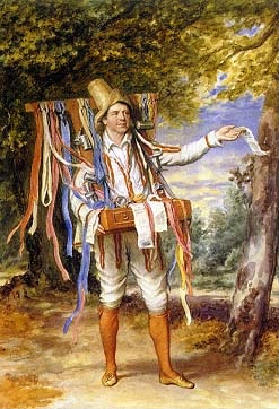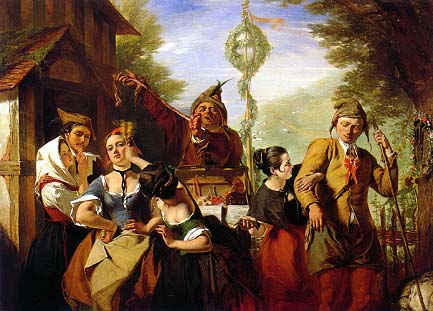Dr. Michael Delahoyde
Washington State University
THE WINTER'S TALE
ACT IV
SCENE i
Time, serving as a chorus, introduces himself:
I, that please some, try all, both joy and terror
Of good and bad, that makes and unfolds errors,
Now take upon me, in the name of Time,
To use my wings. Impute it not a crime
To me, or my swift passage, that I slide
O'er sixteen years and leave the growth untried
Of that wide gap, since it is in my pow'r
To o'erthrow law, and in one self-born hour
To plant and o'erwhelm custom.
(IV.i.1-9)
If he's adopting "the name of Time," then he sounds in his
functioning here more like a playwright.
During this passing of sixteen years, Leontes has become a recluse,
Perdita has grown, and Florizel, the son of Polixenes, is smitten with
Perdita. The elder Ogburns identify Florizel with the Fair Youth of
the Sonnets and elsewhere (Ogburn and Ogburn 852). The "sixteen winters"
(V.iii.50) could, presumably, refer to the sixteen years of marriage
Oxford had with Anne (Ogburn and Ogburn 759).
SCENE ii
Camillo asks Polixenes' permission to return to Sicilia but Polixenes
values him too much and wants him to accompany him in disguise to visit a
shepherd's home and find out why Florizel is hanging around there all the
time. Camillo responds:
What his happier affairs may be, are to me unknown; but I have (missingly)
noted, he is of late much retir'd from court, and is less frequent to his
princely exercises than formerly he hath appear'd. (IV.ii.30-33)
The elder Ogburns detect a reference to de Vere in these lines (Ogburn
and Ogburn 1066). Parallels to Leontes' earlier behavior suggests that
Polinexes has a touch of tyrant in him too, something soon confirmed.
SCENE iii

|
"Sicilia appears to be all court and Bohemia all country" (Garber 828).
In this country setting appears a stage gypsy or rogue, singing a bawdy
song: "When daffadils begin to peer," including the allusion to "summer
songs for me and my aunts, / While we lie tumbling in the hay" (IV.iii.11-12).
He was once a servant of Florizel but has become a petty thief and con-man.
His song continues:
And when I wander here and there,
I then do go most right.
(IV.iii.17-18)
"It might be Shakespeare's 'apology' buried just where one might expect
Shakespeare to bury it, in a song" (Goddard, II 263). If that's so,
the next lines are intriguing:
If tinkers may have leave to live,
And bear the sow-skin bouget [budget = wallet or bag],
Then my account I well may give,
And in the stocks avouch it [testify to my thieving trade].
My traffic is sheets....
(IV.iii.19-23)
|
The character identifies himself as Autolycus. Homer's Autolycus,
grandfather of Odysseus, was a thief; Ovid's Autolycus was a son of
Hermes/Mercury. Mercury was the god of thieves and merchants "which
indicates the rather mixed opinion that the ancients had of merchants
-- possibly with some justice" (Asimov 160). Much praise is lavished
on this character, mostly because he is considered refreshing after
the audience "has suffered the jealous, flesh-hating diatribes of
Leontes" for so long (Bloom 652). Etymologically, the "Auto-" part
of his name should provide a hint, say the elder Ogburns (995).
I'd add that the name ought to signify something like Self-Wolf,
or Self-Enemy, enemy of the self.
When Autolycus comes across the shepherd's son making financial
calculations based on wool sales (and listing various wintertime food
purchases such as "warden pies" (IV.iii.45-46), which are made of winter
pears, currents, rice, prunes, raisins, etc., Autolycus grovels before
him suddenly: "O that ever I was born!" "I' th' name of me," utters the
startled rube (IV.iii.50-51). Autolycus claims to have been beaten by a
footman, robbed, and made to wear rags. His shoulder-blade is hurt
(IV.iii.73). The Clown is sympathetic and gullible, more so when
Autolycus refuses the offer of money, although he does so in the hopes
that the Clown won't realize his pocket has been picked. Autolycus
describes the villain who so abused him:
I knew him once a servant of the Prince. I cannot tell, good sir,
for which of his virtues it was, but he was certainly whipt out of
the court. (IV.iii.87-90)
That part sounds like Oxford. But the description continues:
I know this man well; he hath been since an ape-bearer, then a
process-server, a bailiff, then he compass'd a motion of the Prodigal
Son, and married a tinker's wife within a mile where my land and living
lies; and, having flown over many knavish professions, he settled only in
rogue. Some call him Autolycus.... That's the rogue that put me into this
apparel. (IV.iii.94-104)
This sounds like another of Oxford's assessments of Shakspere, and if so
it's significant that Autolycus transfers his name. The entire scene
amounts to a con based on blurring or shifting identities.
Autolycus will venture onward to his kinsman's place. The Clown leaves.
Autolycus has picked his pocket and, he declares, he will rip off more
people at the sheep-shearing festival: "If I make not this cheat bring
out another, and the shearers prove sheep, let me be unroll'd, and my
name put in the book of virtue!" (IV.iii.120-122). He exits singing.
SCENE iv
A long scene providing "a very superfluity of comic and romantic riches"
(Goddard, II 267) begins with Florizel and Perdita discussing costumes for
the festival. She is modest and awkward about appearing as a goddess, or
"queen" (IV.iv.5), when, after all, she is merely a shepherd's daughter.
What would Polixenes say if he happened by? Florizel insists he blesses
the day his falconry brought him to her hovel, and he would rather have
her than retain his royal status; besides, after all, the gods often
disguised themselves as beasts to go slumming.
Perdita's shepherd foster-father arrives, as do Polixenes and Camillo in
disguise, and others. Perdita is urged to fulfill her hostess function as
mistress of the feast by welcoming all, which she does, giving the
disguised Polixenes and Camillo rosemary and rue nosegays to symbolize
grace and remembrance. A delightful botanical exchange of wit ensues. All
are quite flattering to Perdita. Florizel praises her thus:
What you do
Still betters what is done. When you speak, sweet,
I'ld have you do it ever; when you sing,
I'ld have you buy and sell so; so give alms;
Pray so; and for the ord'ring you affairs,
To sing them too. When you do dance, I wish you
A wave o' th' sea, that you might ever do
Nothing but that; move so, still so,
And own no other function. Each your doing
(So singular in each particular)
Crowns what you are doing in the present deeds,
That all your acts are queens.
(IV.iv.135-146)
This passage has an "incantatory rhythmic function"; it imitates the
"swaying motion" of the sea mentioned by creating a simultaneous
"impression of movement and stillness" (Wells 345).
Perdita agrees to dance with "Doricles," Florizel's assumed name.
Throughout the scene, Perdita "unites the simplicity of a shepherd's
daughter with the poise and grace of a princess" (Goddard, II 268);
"like the flowers she scorns, she is a product of both art and nature" (Wells
346). Polixenes and Camillo detect this nobility in Perdita: "Nothing she does,
or seems, / But smacks of something greater than herself, / Too noble for
this place" (IV.iv.157-159). During a dance arranged by the Clown,
Polixenes asks the shepherd about the young couple, Perdita and Florizel,
whom the shepherd knows as Doricles. The Shepherd reports that "He says
he loves my daughter. / I think so too; for never gaz'd the moon / Upon
the water as he'll stand and read / As 'twere my daughter's eyes"
(IV.iv.171-174). The elder Ogburns take this moon/water reference to
connote Elizabeth and Raleigh (760). The Shepherd says Doricles has
announced his love for Perdita: "If young Doricles / Do light upon
her, she shall bring him that / Which he not dreams of" (IV.iv.178-180).
|
A servant announces a peddler at the door selling songs and ribbons.
Autolycus arrives singing a list of his wares and charming everyone.
The Clown intends to purchase something for his true love, Mopsa, who
gets in a fight briefly with another maid, Dorcas. We are reminded that
the Clown was "cozen'd" on the road (IV.iv.251) and lost his money.
Mopsa wants a print ballad: "I love a ballad in print ... for then we
are sure they are true" (IV.iv.260-261). And what does this imply that
Shakespeare thinks about literalism? Autolycus describes a few ballads
and heads up the performance of one "to the tune of 'Two maids wooing
a man'" (IV.iv.288-289) -- appropriately enough for Dorcas and Mopsa,
fighting over the Clown. All enjoy the dance of the twelve satyrs
(unless, like the BBC, the production mercifully leaves this out
of an already ponderously long Act IV).
|

|
Florizel is goaded by the disguised Polixenes into publicly declaring his
love for Perdita. Polixenes advises discussion with Florizel's father.
The shepherd agrees, but Florizel refuses. Polixenes tears off his
disguise, disowns Florizel, and wants to kill the Shepherd and Perdita,
whom he calls a "fresh piece / Of excellent witchcraft" (IV.iv.422-423)
and a "knack" (IV.iv.428). Perdita instructs Florizel to forget her and
to take up his royal duties: she knows her place and vows resignedly,
"I'll queen it no inch farther" (IV.iv.449). The Shepherd, upset with
Perdita for bringing this misfortune upon him, runs off. Florizel remains
steadfastly devoted, and it is not easy for Camillo to convince him
finally, after marrying Perdita, to sail to Sicilia and seek out Leontes.
They just need disguises.
An insistent theme in the late Shakespeare, the determination to embrace
chastity and lawful marriage rather than sexual license, is here rather
unusually voiced, not by a watchful father (Simonides, Prospero) but by
the young lovers themselves. (Garber 845)
Autolycus enters gloating over the suckers he's fleeced and calling the
people "the herd" (IV.iv.608). Camillo bargains for his clothes to
disguise the young lovers. Perdita acknowledges, "I see the play so lies
/ That I must bear a part" (IV.iv.655-656). When the lovers leave,
Camillo indicates he wants to convince Polixenes to follow after them so
that he himself can see his home, Sicilia, again. Autolycus assures us he
would not report the elopement to the King, Polixenes, since he must be
constant to his dishonest profession (IV.iv.679ff).
The Shepherd and the Clown discuss their defense: that Perdita is a
changeling. Therefore they, being no relations to her, should not be
punished. Autolycus, pretending to be a courtier in his new clothes,
greets them and grills them about where they're going: "Let me have no
lying. It becomes none but tradesmen" (IV.iv.722-723). That, from "a
thoroughly sympathetic character in The Winter's Tale, ... is
Shakespeare's opinion of the class to which Shakspere's father belonged"
(Ogburn 243). The rubes are awestruck: "He seems to be the more noble in
being fantastical. A great man, I'll warrant; I know by the picking on 's
teeth" (IV.iii.751-753). The elder Ogburns take this to be another
identification of Oxford (Ogburn and Ogburn 422). Autolycus, through fear
tactics, gets money out of the Shepherd and his son in exchange for his
ostensible help with the King. Autolycus gloats some more over his good
fortune.
Act V
Shakespeare Index

